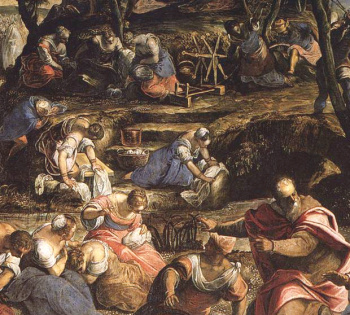The Original Observance
1445 B.C.
The first of six recorded Old Testament Passovers kept by Israel takes place in Egypt (Exodus 12). Just after sunset, as Nisan 14 was starting, they kill a one-year old lamb and spread its blood over the top and sides of their house door. They then eat the lamb "in trepidation" (Exodus 12:11) and stay indoors to be protected from the death angel.
For I will pass through the land of Egypt this night, and will smite all the firstborn in the land of Egypt, both man and beast. And I will execute judgment against all the gods of Egypt. I am the Lord.
And the blood shall be a sign to you upon the houses where you are. And when I see the blood, I will pass over you. And the plague shall not be upon you to destroy you when I smite the land of Egypt (Exodus 12:12 - 13, HBFV throughout).
The Passover, according to the Old Testament, is commanded to be kept forever by God's people.
And this day shall be a memorial to you. And you shall keep it a feast to the Lord throughout your generations. You shall keep it a feast as a law forever (Exodus 12:14).
Wilderness Passover
1444 B.C.
The Israelites, after leaving Egyptian bondage, travel to the wilderness of Sinai. They then, with Moses as their leader, celebrate their first Passover outside Egypt.
And the Lord spoke to Moses in the wilderness of Sinai, in the first (Hebrew) month of the second year after they had come out of the land of Egypt, saying, "Let the children of Israel also keep the Passover at its appointed time . . . " (Numbers 9:1 - 2).

The Israelites will not celebrate another Passover until they enter the Promised Land thirty-nine years later.
First Promised Land Observance
1405 B.C.
The children of Israel, in mid-April of 1405 B.C., crossed the Jordan River into the Promised Land (Joshua 4:19). Before they could keep their first Passover in the land they would inherit, however, they had to perform a rather painful procedure.
At that time the Lord said to Joshua, "Make sharp knives for yourselves and circumcise the children of Israel again, the second time." (Joshua 5:2).
God commanded his people to have all their males circumcised in order for them to partake of the Passover (Exodus 12:48). The generation of males that entered the Promised Land, unlike their fathers who died in the wilderness, were not circumcised (Joshua 5:5 - 7).
Roughly 600,000 men (see Numbers 1:46), all at one time, are circumcised at a place aptly (and no doubt painfully) named "the hill of the foreskins" (Joshua 5:3). The people, on the plains of Jericho, then observe the Passover after a few days had passed (Joshua 5:10).
Hezekiah's Unique Passover
715 B.C.
King Hezekiah ascends to Judah's throne in 715 B.C. as the first ruler in 215 years to start his reign without the existence of the northern 10 tribes (the Kingdom of Israel). Upon assuming power He quickly begins to repair the temple and has the idols found within it destroyed (2Chronicles 29). He also commands that God's house be cleansed so that its services could be restarted.
Hezekiah, unable to have the temple ready to celebrate Passover at its usual time of the 14th day of the first month, makes arrangements to have it kept on the 14th day of the second month (per Numbers 9). He then takes the incredibly bold step of inviting all Israel, including anyone who escaped Assyrian captivity from the northern tribes (2Chronicles 30:6), to come to Jerusalem for the feast.
And Hezekiah sent to all Israel and Judah, and wrote letters also to Ephraim and Manasseh, that they should come to the house of the Lord at Jerusalem to keep the Passover to the Lord God of Israel (2Chronicles 30:1).
The celebration of Passover and the seven days of Unleavened Bread (2Chronicles 30:21 - 22) are so successful that the king and the people mutually agree to keep another seven days of Unleavened Bread (verse 23)!
And there was great joy in Jerusalem, for since the days of Solomon the son of David, the king of Israel, there was nothing like this in Jerusalem (2Chronicles 30:26).
The Last Righteous Ruler
c. 622 B.C.
The Kingdom of Judah, after Hezekiah dies in 686 B.C., has to endure the evil reigns of King Manasseh and Amon for a total of 46 years. Then, in 640, at the tender age of 8 (2Kings 22:1), Josiah assumes the throne. When he turns 20, he begins to purge the land of its idolatry (2Chronicles 34). He also sets his hand to cleansing Jerusalem and its temple of all its abominable practices. At the age of 26 he commands that the Passover be kept.
And Josiah kept a Passover to the Lord in Jerusalem. And they killed the Passover on the fourteenth day of the first month (2Chronicles 35:1).
Josiah, the last righteous ruler of Judah before the nation is taken into Babylonian captivity, dies in 609 B.C.
Ezra's Observance
516 B.C.
The sixth of six Old Testament Passovers takes place during the time of Ezra. The Jews, after returning to Judah and Jerusalem from Babylonian captivity, rebuild Jerusalem's temple. This rebuilding completes in 516 B.C. and the temple is rededicated to God. After the rededication the people keep the Passover and the Feast of Unleavened Bread with great joy!
And the children of Israel, the priests, and the Levites, and the rest of the children of the captivity kept the dedication of this house of God with joy . . .
And the children of the captivity kept the Passover on the fourteenth day of the first month . . . And they kept the Feast of Unleavened Bread seven days with joy (Ezra 6:16, 19, 22).